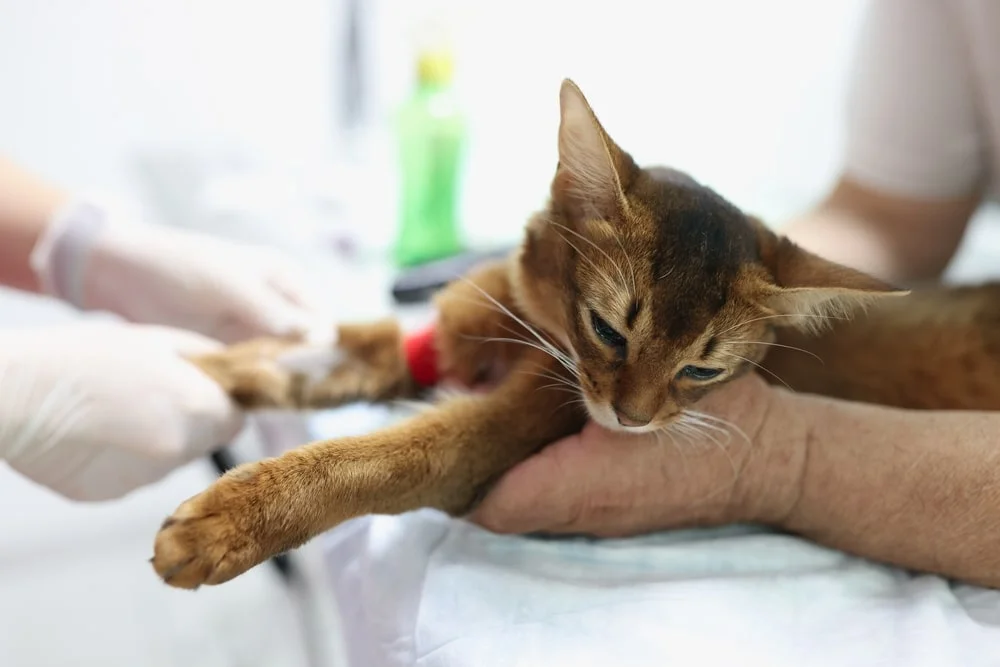PET HEALTH
Cats in need of blood transfusions are often dealing with serious health conditions. But starting at roughly $500 per treatment, not all cat parents may be able to easily pay for this crucial procedure.1 Having to choose between your cat’s health and the vet bill is a situation no pet parent wants to be in. Learn more about cat blood transfusions, the cost, and how cat insurance could help you cover vet care expenses.
MetLife Pet Offers Coverage for Cat Blood Transfusion Costs
Explore Your Options
Feline Blood Transfusion Costs
The cost of a blood transfusion in cats can range from $500 to $2,000 or more.1 Ultimately, the cost of the procedure depends on factors like how much blood is needed, your cat’s condition, where your vet is located, and if there are any transfusion complications. The procedure might also become a recurring expense if your cat has a chronic condition or illness that requires multiple transfusions.
You may be able to get coverage for costly cat blood transfusions with a MetLife Pet Insurance policy. With reimbursement options up to 90% on covered costs, your cat’s treatment may be easier to manage.2
How Cat Blood Transfusions Work
Blood transfusions in cats are fairly simple, but many steps are taken to make sure it’s safe and effective for your cat. Vets determine your cat’s blood type to ensure a compatible donor blood type is used. Donor blood is typically tested for infectious diseases so they aren’t passed on to your cat, and cross-matched with your cat’s blood to see if any reactions might occur during a transfusion.3,4
Once the right blood is found, your cat receives it in an intravenous (IV) line with a blood filter. The transfusion could take up to 4 – 6 hours, depending on your feline’s condition. Your cat’s health and vital signs will be closely monitored before, during, and after the transfusion to ensure there are no negative reactions. Sedatives will likely be used to keep your cat calm during the procedure.3,4
When Are Cat Blood Transfusions Needed?
Cats may need a blood transfusion after extreme blood loss caused by an injury. They might also need one when they have anemia — a condition where low red blood cell counts lead to decreased oxygen circulating in the body.1,3,5
Anemia can be caused by diseases or health conditions that affect the production or destruction of red blood cells, like kidney disease, feline leukemia virus (FeLV), bone marrow disease, parasites, or autoimmune diseases.1,3,5 Some signs of anemia that indicate a cat blood transfusion could be beneficial include:5
- Lethargy
- Pale gums
- Excessive sleeping
- Difficult or rapid breathing
- Increased heart rate
If you recognize any of these symptoms in your kitty, they may be suffering from anemia and any underlying conditions causing it. It’s a good idea to call your vet right away, so your cat can be examined, diagnosed, and treated.
What Does a Successful Cat Blood Transfusion Look Like?
A successful cat blood transfusion usually results in immediate improvement of your cat’s health. Symptoms like irregular breathing and heartbeat may stabilize quickly because more oxygen is circulating in the body. This can help most cats regain their energy and appetite.1
The long-term success of blood transfusions depends on identifying the underlying cause of the anemia and treating your cat for it. Your cat might also require multiple transfusions to combat the anemic effects of their condition.1,4 Chat with your vet to help you set expectations based on your cat’s unique situation.
Potential transfusion reactions
Cat blood transfusion reactions are possible — but rare — and categorized as immunologic or non-immunologic. They typically happen soon after a transfusion starts (acute reactions), although they can be delayed.3
Immunologic reactions occur because a cat’s immune system rejects the blood from the transfusion. Non-immunologic reactions can include blood contamination, overload of blood volume, fever or freezing, infectious disease transmission, respiratory issues, and more. Testing for a correct donor blood match before the procedure can help ensure a more successful transfusion.3
MetLife Pet Can Help You With Vet Care Costs
Taking care of a sick cat can be stressful, and money is the last thing any pet parent wants to worry about. With a MetLife Pet cat insurance policy, you could get reimbursed up to 90% on covered expenses — like cat blood transfusion costs.2
MetLife Pet helped the parents of a 6-year-old cat named Benny when he was hospitalized with anemia symptoms. He received supportive care and a blood transfusion to help stabilize him. The vet bill was around $2,200, but MetLife Pet reimbursed Benny’s owners close to $1,900.6
Being prepared for accidents and illnesses with cat insurance can help you keep your beloved companion healthy and happy. Enroll your cat today, starting with a free quote.
Pet Insurance May Help You Cover Cat Blood Transfusion Costs
855-270-7387


